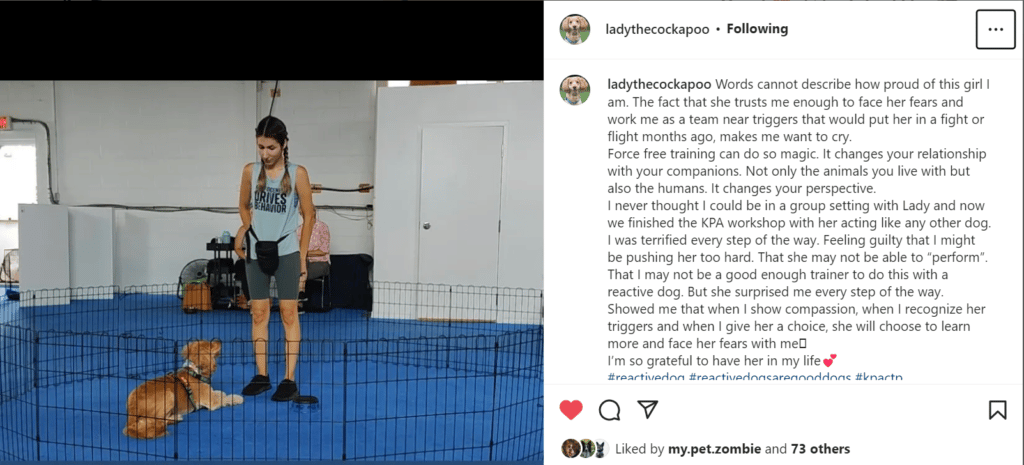There are a huge number of programs out there promising to teach you how to become a dog trainer. But there are only a few that actually give you the level of education and practical experience needed to truly BE a professional. The Karen Pryor Academy Dog Trainer Professional Program does just that. Based in humane methodologies, this program takes you from average to extraordinary Read on as 3 of our instructors share their experience in the program.
Why did you want to go through the KPA Dog Professional Program?
Anita: I am always looking to extend my knowledge and learn better ways to help people and their pet dogs strengthen their bond. KPA is a well known program, and, of course, it focuses on R+ training which is very important to me. I wanted to challenge myself in a hands on training experience.
Erin: No matter how long you’ve been involved in animal training, there will always be ways to level up. Continuing to perfect and polish my skills as a dog trainer makes me more effective as teacher, for both my human and animal learners. KPA showed me my strengths as a trainer, and helped me smooth out my weaknesses.

KPA graduation certificate
What were you expecting to learn from the program?
Luca: I expected to fine-tune my skills and learn scientifically proven strategies to get the most out of my training. I wanted to get a certification that demonstrated my commitment to and knowledge in R+, science based training at a high level.
Erin: Improving my skills as a clicker trainer was top of mind for me, and the KPA Professional Program did not disappoint. After speaking with previous graduates, I had heard the program was intensive, hard work, and lots of fun. I was really expecting to buckle down and learn more about how to become an efficient and effective trainer, so that my clients can get the results they want quickly!
What was the most valuable thing you learned from the program?
Anita: When in doubt, go back to basics. I was working with Lady through her triggers and reactivity, and learned to look at her triggers as a very big distractions. Going back to basics worked better than I imagined!
Luca: I learned how to more effectively structure training sessions to avoid boredom/quitting by the learner and to maximize efficacy. The most difficult part was the workload in preparation for Workshop 2, and how to manage that without Zoe burning out.
What was the most difficult thing for your dog?

Erin: I participated in the program when Dill was just 6 months old. Working with such a young dog was incredibly difficult during the full day workshops on the weekends. At home, we could train in short sessions, to avoid frustration (for both him and I!). At the workshops we really had to work on settling in an exciting environment; a challenge for any young puppy!
Anita: Training a second species animal was definitely the most challenging for me. I was training some pet rats and it was more challenging than I thought. Once I figured it out, turned out to be a lot of fun! Rats get scared with sudden movements and noises and have a very short attention span. You need to be fast, but very gentle to make sure they don’t run away in the middle of the training session!
What piece of advice would you give to somebody interested in dog training, or just getting started in their dog training career?
Anita: Always continue learning and be kind to yourself and your dog. I think it is easy to forget that we should set ourselves up for success as much as our dogs in our training journey. Dog training is a big world and you can’t learn everything at once, so start with small steps and be patient with mistakes, whether they are your dog’s mistakes or yours.

Erin: Find your tribe! Build relationships with experienced and passionate trainers that have committed themselves to humane training methods. After graduating the KPA program, I now have ability to connect with other KPA-CTPs all over the world. Being able to discuss and evolve together makes us all better trainers.
Congratulations to Erin, Luca, and Anita for successfully earning their Karen Pryor Academy Clicker Training Partner designation!
Want to know more?
At When Hounds Fly we are lucky enough to have Andre Yeu, our founder, as a faculty member at the Karen Pryor Academy. Andre is one of only two Canadian KPA faculty members teaching the DTP program.
